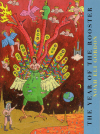The Year of the Rooster
The Year of the Rooster, Noah Eli Gordon’s eighth book, examines a crisis of faith: a poet-narrator who questions his impulse to write and not write, the trappings or usefulness of theory and craft, and the very ability of poetry to signify. Gordon, an assistant professor at the University of Colorado at Boulder where he directs Subito Press, also founded chapbook publisher Letter Machine Editions with Joshua Marie Wilkinson in 2007; they both co-edit The Volta as well. Gordon is a writer fully immersed in a poet’s life, but his narrator questions the impact of such an immersion.
The Year of the Rooster, Noah Eli Gordon’s eighth book, examines a crisis of faith: a poet-narrator who questions his impulse to write and not write, the trappings or usefulness of theory and craft, and the very ability of poetry to signify. Gordon, an assistant professor at the University of Colorado at Boulder where he directs Subito Press, also founded chapbook publisher Letter Machine Editions with Joshua Marie Wilkinson in 2007; they both co-edit The Volta as well. Gordon is a writer fully immersed in a poet’s life, but his narrator questions the impact of such an immersion.
“Diminishing Returns,” the first section of this collection, starts with a 14-line poem; each subsequent poem gets smaller, eventually stilling to a single line in the last poem. The long lines of this section are an examination of music and of stillness: “If I stand still long enough, someone will walk around me.” The result is equal parts postmodern cerebral experiment and Whitman-esque sound-and-image-driven manifesto on contemporary life: “There’s nothing like the present, like the president, like a precedent leaking / in analog its continuous signal. Life on Capitol Hill is calamitous! cries the paper.”
Thus is a tension between retreat and the crow of the rooster announced: “During the intervening successive moments, I’ve / decided to exclude myself from the conversation, as it too is in its entirety / a single instant in which I’ve already moved on. Here’s me heading back.”
Additional tension is found in the clever impulse behind allusion to Gilbert and Sullivan to “fearful symmetry” and liberal use of the ampersand, and the impulse behind an earnest discussion of music and balance, “sentimental as an anecdote driven toward self-deification.”
The second section, “The Year of the Rooster,” is a relief at this point. Here, Gordon switches to shorter lines, to changing shapes and to what can be read as a long poem or a series of untitled poems. Compared to the previous section, these poems appear disjointed, transitionless: “They gave me a trumpet & I think of the movies / & loneliness like a bottled up doubt.”
The conflict here: “You’re not presenting an idea; you’re stating a problem.” This section is looser, with occasional waterfalls of rhyme, alliteration, assonance, anaphora, slant. It is playful and looking for something new:
dressed in grammar
as clamorous as a walkon’s
wish for a few words
a deadening idea
marries itself
to whatever I’ve been
trying to get across
. . . . . . . . . . . . . . . . . . .
Blah, blah, blah—the body
La, la, la—Lacan
Gordon here seems almost disdainful; received knowledge and theory are presented as nonsense. As he transitions into the next section, he interrogates the risks of poetry:
A poem runs the risk
of being meaningfully
a little case study
illustrating what
one can fit inside
The poet, too, can be a casualty, sacrificing “real life” for a view from the sidelines:
Call it the long afternoon made longer when one’s attempt to eke from it some
modicum of joy, however intangible, gives way to the internal pressure of
having to produce a monument to the same effort
. . . if you wouldn’t have been better off biting into the apple
without the burden of accounting for how you’d later abandon the core.
But of course, the book is rounded out with “Returning Diminishments,” which grows from a single line to the fourteen we started with. “Routine will return you there,” Gordon exhorts. The writing itself is the meaning behind the writing, and we understand it by doing it.





